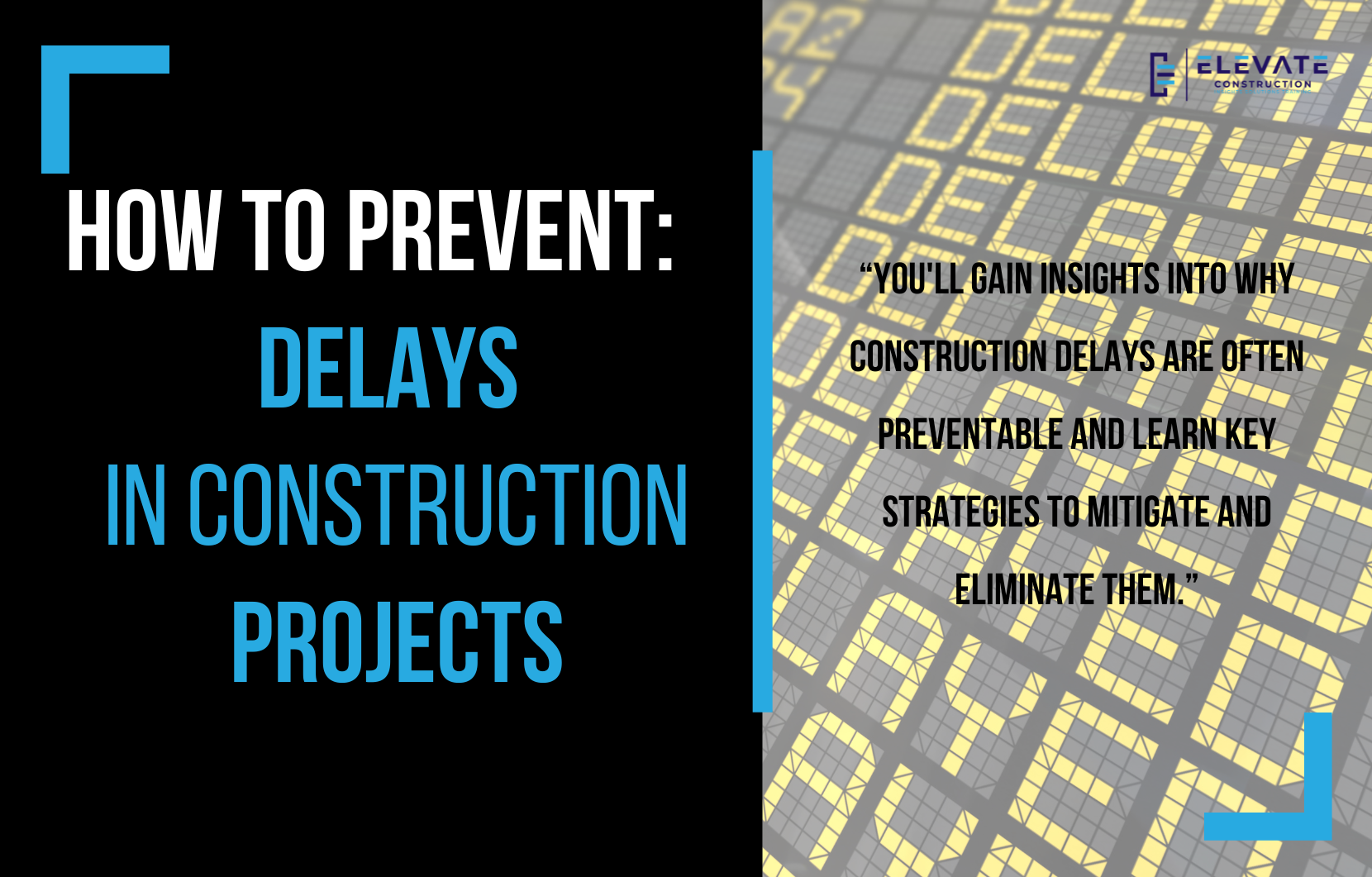Introduction: In this blog post, we will delve into the critical topic of avoiding delays in construction projects. Delays can have severe consequences on a project, impacting timelines, budgets, and team morale. By the end of this post, you’ll gain insights into why construction delays are often preventable and learn key strategies to mitigate and eliminate them. Let’s dive into the valuable content that will empower you to keep your construction projects on track.
Understanding Construction Delays: Firstly, let’s define what a construction delay is. It’s anything that halts the progress of your work, whether it’s due to material procurement issues, lack of information, or disruptions in the supply chain. Recognizing delays early on is crucial, as they can lead to significant setbacks, financial losses, and demoralization within the team.
Identifying Preventable Delays: The speaker highlights that most construction delays are preventable. However, common mindsets often lead to overlooking preventable delays. Some may consider construction inherently chaotic, accepting delays as inevitable. Alternatively, others may fail to look far enough into the future to anticipate and prevent potential roadblocks. The key is to distinguish between preventable delays and inevitable delays, focusing on factors within your control.
Roadblocks vs. Constraints: To effectively prevent delays, it’s essential to differentiate between roadblocks and constraints. Constraints are permanent aspects that must be worked around, such as neighboring structures or specific weather conditions. On the other hand, roadblocks are removable obstacles that can be identified and mitigated. By understanding these distinctions, teams can proactively address roadblocks and enhance project efficiency.
The Importance of Focusing on Removing Roadblocks: Focusing on removing roadblocks becomes a leading indicator system for project success. Unlike lagging indicators such as completion percentages, a leading indicator system anticipates challenges in advance. Teams should actively track and address roadblocks, fostering a proactive approach to prevent delays before they occur.
How to Prevent Delays Through Procurement: Procurement plays a pivotal role in preventing delays. The blog emphasizes the need for a robust procurement log and schedule from day one. Tracking and managing procurement early in the pre-construction phase is crucial, ensuring that long-lead items are ordered promptly. The blog challenges the misconception that delays attributed to supply chain issues are solely the responsibility of trade partners, emphasizing that general contractors must take an active role in managing procurement effectively.
Advantages of Having a Great Quality Process: Installing materials correctly the first time is a significant factor in preventing delays. A strong quality process ensures that expectations are clear, reducing the need for rework and avoiding delays caused by incorrect installations. By establishing transparent communication and aligning all stakeholders on quality standards, teams can enhance project efficiency and prevent setbacks.
Importance of Make Ready Look-Ahead Planning: The concept of making work ready involves planning activities for the next six weeks, assessing manpower, materials, information, equipment, and permissions. This proactive approach allows teams to identify potential roadblocks in advance and take necessary steps to mitigate them. Visualizing the next six weeks fosters collaboration between project managers, superintendents, and foremen, ensuring that all elements are in place for a smooth workflow.
Learn More With These Resources: To further support your efforts in preventing delays, the blog encourages readers to explore additional resources. Graphics, manuals, and downloads are offered to help implement effective roadblock removal systems, procurement strategies, and quality processes. By subscribing to the channel and engaging with the content, readers can access valuable insights and tools to elevate their construction projects.
Conclusion: In conclusion, preventing delays in construction projects requires a proactive mindset, strategic planning, and effective collaboration. By distinguishing between preventable delays and inevitable constraints, implementing robust procurement and quality processes, and adopting a make-ready look-ahead planning approach, teams can enhance project efficiency and successfully avoid delays. Embracing a culture of roadblock removal and continuous improvement will contribute to the overall success of construction projects.
If you want to learn more we have:
-Takt Virtual Training: (Click here)
-Check out our Youtube channel for more info: (Click here)
-Listen to the Elevate Construction podcast: (Click here)
-Check out our training programs and certifications: (Click here)
-The Takt Book: (Click here)
Discover Jason’s Expertise:
Meet Jason Schroeder, the driving force behind Elevate Construction IST. As the company’s owner and principal consultant, he’s dedicated to taking construction to new heights. With a wealth of industry experience, he’s crafted the Field Engineer Boot Camp and Superintendent Boot Camp – intensive training programs engineered to cultivate top-tier leaders capable of steering their teams towards success. Jason’s vision? To expand his training initiatives across the nation, empowering construction firms to soar to unprecedented levels of excellence.
On we go!


